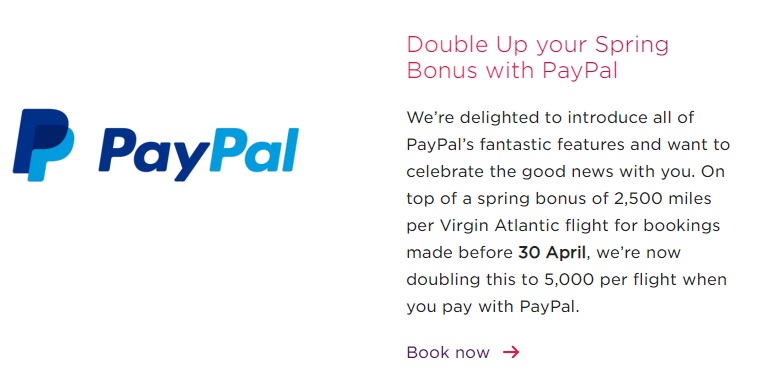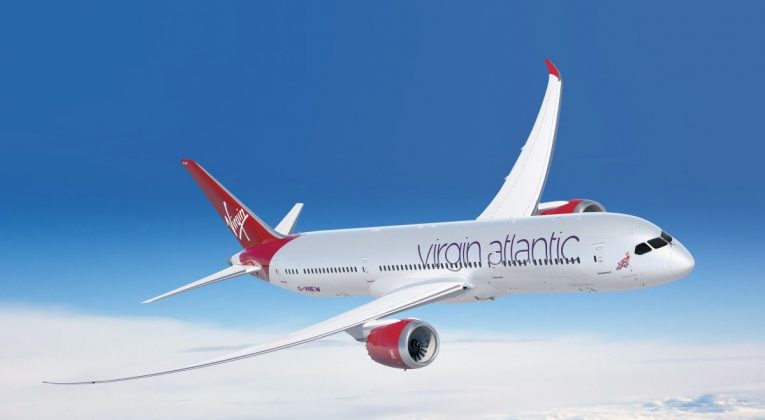Some links to products and partners on this website will earn an affiliate commission.
Virgin Atlantic is desperate for your cash! Recently, I wrote about how Virgin Atlantic was offering 2,500 bonus miles for each Virgin Atlantic flight booked before 30 April, 2020 – click here for details.
Recently, this offer was improved, but only for those who are willing to pay with PayPal. You can earn 10,000 bonus miles for a return ticket – 5,000 miles per flight – again booked before 30 April, 2020. You must fly before 31 March, 2021 and the bonus miles will be earned after your flight.

What You Need to Know About PayPal
According to “Section 75” of the Consumer Credit Act, your bank must reimburse you for any spend above £100 if the merchant fails to deliver as promised. Crucially, this only applies to CREDIT CARDS. (i.e. consumer credit) Because of their exposure to the merchant, many banks won’t pass along your money in a timely fashion.
Because there is no credit element involved (in nearly all circumstances), you are not covered by Section 75 if you choose to pay via Paypal. This situation applies even if you use a credit card to pay via Paypal. You are instead covered by Paypal’s own woolly Paypal Buyer Protection policy, which is essentially just a goodwill policy that allows…
PayPal to make a final decision at its full and sole discretion on any problem raised by a buyer in respect of any purchase paid for using PayPal.
Why?
Well… I think that it’s pretty simple. Due to their Section 75 exposure, banks aren’t passing along whatever money Virgin Atlantic is managing to earn from selling tickets. And Virgin Atlantic is desperate for money to stay alive…
But if the airline offers a bonus for paying with a debit card or bank transfer, etc. alarm bells would start ringing everywhere… as that would be a clear sign that the airline is going bankrupt sooner rather than later. A Paypal-specific offer is sufficiently disguised as a special partner promotion, but the implications are the same – Paypal will be immediately passing your money along to Virgin Atlantic, whilst you lose any statutory rights to receive a refund should Virgin Atlantic stop operating.
The Bottom Line
I have a really bad feeling about Virgin Atlantic. I would be thrilled if the airline manages to pull through, but I have my doubts about how the government could even structure a bailout of the airline – a topic I’ll cover in a future post.
It’s worth noting that if you are tempted to book a codeshare flight on Delta or another partner, only Virgin Atlantic OPERATED flights qualify for the bonus.
So, this 10,000 bonus mile offer is really for the truly adventurous amongst you.






Might be worth nothing they have also totally scrapped the new Sao Paulo route that was delayed until October.
Since when do banks not pass over money due to Section 75 exposure?
Section 75 only applies to credit cards.
I know. How is that related to what I was asking?
Sorry, I misunderstood. They arent passing money over to Virgin because there is a reasonable chance they might go bust. And if they do the banks will have to repay all that cash back to the consumers. The bank is holding on to it until Virgin look like they will actually be able to provide the flights they are taking the bookings for.
I know what they were saying. I’m fully aware what section 75 is as well as what Craig was saying.
My question was since when was that a thing that banks did let alone were able to do?!
Maybe try and find your answers in a finance blog rather than a travel website. Also might be worth looking up a website on getting some manners whilst your at it.
James, I asked a straightforward question because I didn’t know the answer and the writer clearly did. You made two posts stating facts that are not only common knowledge but also are necessary to know before being able to even formulate such a question.
I don’t think anyone has been impolite here apart from maybe you forcing me to explain at length that I’m actually asking a question of someone who clearly is more familiar with this than me rather than batting off patronising and babying explanations of very basic concepts.
By the way, regarding manners, it was you who made the comment “hopefully your alleged ‘blog’, or commentary, or whatever you want to call it, will be one of the things lost by the end of this year too.”
By the way, regarding manners, it was you who made the comment “hopefully your alleged ‘blog’, or commentary, or whatever you want to call it, will be one of the things lost by the end of this year too.”
– No it wasn’t. Why would I say that? That was someone called Jamie. Buy some glasses.
Ill agree to ignore you from now on and you agree to ignore me from now on.
Glad we got that sorted.
My bad and my apologies fort hat confusion.
With any service provider, not just airlines, banks can:
1. decline all service transactions
2. hold on to the money until the service is provided
The alternative is to take unlimited credit risk on any service provider who can get their hands on a credit card machine, in exchange for the tiny portion of the interchange fee that the banks keep. Not much of a profitable business model…
In normal times, Bank XYZ holding onto airline money until the flight happens is as close to cash as the airline actually receiving the cash and depositing it back with Bank ABC or XYZ.
But if you have an alternative explanation, I welcome it…
Craig, I assume we’re talking about credit card companies not banks here (correct me if I’m wrong). I understood that the merchant receives the money immediately and the credit agreement is between customer and bank (the bank doesn’t have its own credit agreement with the merchant). If services payments are somehow different to other contractual agreements that’s new to me.
All I know is for example with the protocol of a chargeback (rather than a S75), the transaction has gone through and cleared and the merchant has the funds until the customer starts the chargeback where it’s reversed for further investigation. I wasn’t aware with either credit card or debit card transactions than credit card companies can hold on to payment (but then I’ve been able to find no evidence either way). Could you point out something explaining the exact process here by which credit card companies withhold money from merchants as this is the first I’ve heard of it? Is this new since only a very short time?
Well… Visa and Mastercard are just logos, so when I refer to banks I mean the card issuer, which in most cases is a bank of some kind.
Of course there’s no credit agreement with the merchant, but the card issuer is jointly liable under Section 75. Therefore the banks are essentially taking credit risk on the merchant because they could be forced to pay back the consumer based on the merchant not performing as contracted. With goods that’s no big deal, since they are handed over at the time of sale. But with services, especially future ones, it’s not so straightforward.
I can’t point you in the direction of anything official though. I could be wrong – it wouldn’t be the first time – but I see too much opportunity for fraud and credit exposure if a merchant receives funds today for a service they promise to deliver in 6-12 months time.
With chargebacks too at least, the merchant can always (with the same fee scale as vice versa) claim the cash back even after the bank has claimed they want to reverse the original transaction.
Cinereus, Ok Next time I will look into my crystal ball and figure out what you already know and understand before I answer. I was only trying to help.
Perhaps next time you can just ignore my response rather than snappy little comments like: ‘I know. How is that related to what I was asking?’
Note that the author didnt give you the response you were looking for either. Perhaps your in the wrong place for general credit card enquiries.
Because if someone asks “Since when do banks not pass over money due to Section 75 exposure?” they are asking that question.
They are not asking “What is Section 75?”, “When does Section 75 apply?”, “Can someone tell me about section 75?”, “How do I google Section 75?”. They chose those precise words for a reason rather than any other words. So when I asked that, I only needed information about what I asked, not a patronising response making the offensive assumption that the writer is either too basic to have heard of Section 75 before asking about Section 75 or thick to use Google.
Perhaps next time you can ignore my response unless you actually have an answer?
Craig,
It seems that you’re probably right. There is precedent for payments to be withheld for example with Flybe and Thomas Cook. It’s the acquiring bank (the card processor for the airline) who withholds the funds though.
It all seems very dodgy and, with a lot of experience using PayPal from a business point of view, I would be confident it will help their cashflow problems. But you’re probably spot on with the reasoning. Just surprising the incentive isn’t much better.
Cheers. It certainly makes sense to me that the card processor should have “skin in the game” if they are facilitating a joint and several liability for the credit card issuing banks…
PayPal UK says in user agreement: Buyer Protection lets buyers of eligible goods and services recover all or part of their PayPal payment for those purchases, if they were not delivered or are significantly not as the seller described them.
To receive Buyer Protection, you must file a claim, and time limits apply.
PayPal does NOT specifically rule out air travel/ ticket purchases from buyer protection. If you do not receive the service you have paid for within 180 days FROM PAYMENT you loose your rights to claim, so basically you have six months of cover. I f the ticket is bought but the service not used until after 180 days, you have no protection.
So Pay Pal does offer some respite – I have bought BA and Lufthansa tickets in the past this way and its been fine, but then I always took the flights.
There’s no question that Paypal offers buyer protection. Whether it will step up and pay out millions after a VS insolvency is something that I question…